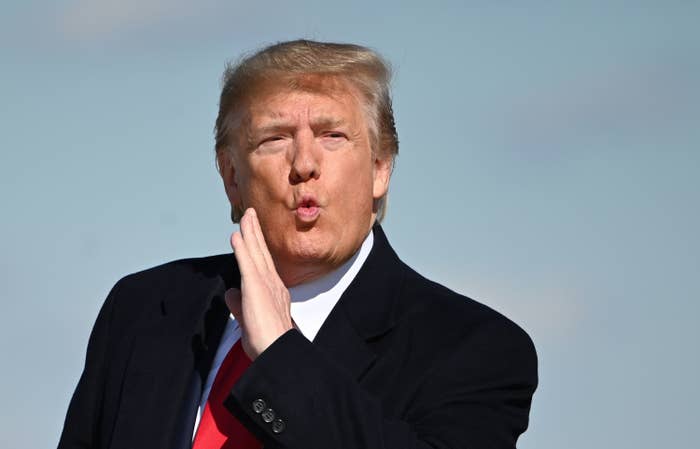
Several hours into her testimony to impeachment investigators, Marie Yovanovitch, the former US ambassador to Ukraine, breaks down. She asks to take a minute, and once she’s collected herself, an aide to the House committee says, “We understand this is a difficult and emotional topic.”
Minutes earlier, Yovanovitch, had recounted the rush with which she was recalled from her post by President Donald Trump — the calls from senior State Department staff in the middle of the night telling her she’d “need to come home on the next plane,” that they were concerned for her safety. She repeats, as she does over and over again, in her more than 300 pages of testimony released Monday, that it all left her “shocked.”
Days after leaving Kyiv, following a public vilification campaign led by former Ukrainian prosecutor Yuriy Lutsenko and Rudy Giuliani (and amplified by Donald Trump Jr.), she finally makes it to the State Department offices in DC, where she meets Assistant Secretary Phil Reeker and then–deputy secretary John Sullivan, who apologizes for what is happening to her. “What have I done wrong?” she asks. “He repeated what Phil had already told me, which is that this was coming from President Trump, this was, you know, final, and that I — that the reason they pulled me back is that they were worried that if I wasn't, you know, physically out of Ukraine, that there would be, you know, some sort of public either tweet or something else from the White House,” Yovanovitch tells the room. “And so this was to make sure that I would be treated with as much respect as possible.” Minutes later, she falls apart.
Yovanovitch’s testimony is many things: a roadmap to Giuliani’s parallel diplomacy, an inside look at how Republican members of Congress are treating the inquiry, a crash course in Ukrainian politics. But more than anything, it is a revelation of how at least one entire section of the US government — in this case, the State Department — has come to live in total fear of the Presidential Tweet. Yovanovitch was initially told, by Carol Perez, the head of the foreign service, that she was being abruptly pulled from Kyiv for her safety. Sullivan revealed the real reason: They were worried she would be fired by tweet.
Earlier in her testimony, Yovanovitch revealed how she pleaded for public State Department support as the campaign against her quickly spiraled. She had already been warned by Ukraine’s powerful interior minister, Arsen Avakov, that she “needed to watch her back” as Giuliani’s associates, Lev Parnas and Igor Fruman, in concert with Lutsenko, pushed for her removal. She turned to Under Secretary David Hale, seeking a statement from Secretary of State Mike Pompeo, something public to bolster her. “What I wanted was the Secretary of State to issue a statement that said that, you know, I have his full confidence or something like that, to indicate that I, in fact, am the ambassador in Ukraine, and that I speak for the President, for the Secretary of State, for our country,” Yovanovitch told investigators. She says she never heard anything back, and no statement was ever issued.
Reeker later provides her with an explanation. “I was told there was caution about any kind of a statement, because it could be undermined,” she tells investigators. They ask: by whom? “The president.” In what way? “Well, a tweet or something.”
Nearly three years into the Trump era, it’s become clear how the president has rendered much of the government irrelevant in terms of setting policy. How many initiatives — not to mention careers — have been killed by a Trump tweet? In the early days, reporters would rush to understand which policy Trump was referring to whenever he dropped an explosive tweet. (Remember the flood of “Pentagon in the dark” stories after Trump tweeted he was banning trans people from serving in the military?) Now, we all know his tweet is his attempt to set the policy.
What Yovanovitch’s testimony shows is how that plays out in very real ways in the lives of those who have chosen to serve the US government. Yovanovitch was abandoned by the institution she has served for 33 years — and then pulled from her post in the middle of the night — both times because those at the highest levels of the State Department feared what Trump would tweet.
In a massive investigation published this weekend, the New York Times illustrated how Trump wields the power of his Twitter account, and how those around him scurry to react. As two former senior advisers told the paper, they heard the president say, “If I don’t tweet it, don’t listen to my staff.”
That’s something that some people around Trump have readily accepted — and something harder for career officials, like Yovanovitch, who served in a time when the president didn’t tweet like it was his job.
As Yovanovitch saw the campaign against her grow to unimaginable heights, she turned to Gordon Sondland, a Trump donor who was made ambassador to the EU, for advice. “He said, you know, you need to go big or go home. You need to, you know, tweet out there that you support the President, and that all these are lies and everything else.” She…didn’t take the advice.
